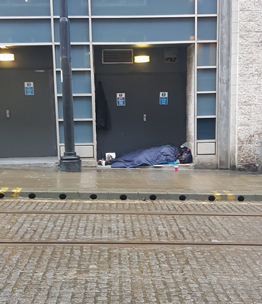Manchester is among the latest towns and cities looking to bring in a Public Space Protection Order (PSPO) to combat anti-social behaviour. The boundary for Manchester City Council’s city centre-wide proposed PSPO runs from the Manchester Arena in the north to the A57M and the Manchester Met University campus to the south.
Like many PSPOs, Manchester’s – it’s out to consultation until April 8 – would criminalise (or further criminalise what are already offences) what the council calls ‘unacceptable’ behaviours:
Drinking alcohol in a non-licensed public space;
Failing to dispose of commercial waste responsibly;
Failing to pick up and properly dispose of litter when asked to do so by an authorised officer;
Discarding hypodermic needles or syringes in a public space (except in an appropriate sharps container);
Urinating or defecating in a public space (except a toilet);
Aggressive or intimidating begging;
Occupying a tent or other temporary structure in a manner likely to create a health and safety risk for other people; and
Obstructing a building entrance or exit (as pictured, by Mark Rowe), stairwell or highway after being asked to move by an authorised officer.
The council points to its survey last summer that found begging, defecation and urination and overall cleanliness as reported city centre nuisances; besides verbal abuse and intimidation and drug needles among litter disposed in public.
Homeless in Manchester were pictured in the March 2019 print issue of Professional Security magazine for its article asking if the homeless are a ‘security issue’. Southend was reported as among towns looking to PSPOs to tackle retailer and others’ concerns that such low-level anti-social behaviour is lowering the quality of life and putting off shoppers and visitors; while the high street is already suffering from the internet and out of town shopping malls that secure themselves more against beggars and rough sleepers.
Hence PSPOs, made law under the Anti-Social Behaviour, Crime and Policing Act 2014, in 2015; any PSPO is for three years and can be renewed as some have been already. In Barnsley, for example, where the metropolitan borough council brought in a PSPO in 2016, it’s proposing to add ‘repeated and aggressive begging’ when renewing its expiring order.
Barnsley councillor Jenny Platts, Cabinet Spokesperson for Communities, said: “We all want to have a town centre which is vibrant, safe and welcoming. The PSPO continues to be an important tool in making that a reality but we also want to ensure that those in need are able to access the relevant support services. We are working with partners and voluntary organisations to focus our resources on helping the people most in need, while at the same time continuing to address anti-social behaviour.”
A report to the council described the PSPO as successful, and causing a ‘gradual behaviour change’ in the town centre. However, the report also contains lines that appear to say the opposite, as the ‘ongoing problem’ remains – hence the need for the order to stay. The council says that services will continue to work closely with people who find themselves begging as a source of income.
If a PSPO is not kept to, offenders can have a fixed penalty notice of £100, or court and a larger fine. Campaigners complain that such orders criminalise and penalise people for being on the streets homeless. This human rights criticism evidently hits home with councils; the Barnsley report differentiated ‘aggressive’ begging from ‘passive’ and ‘active’; and called for an ‘selective and judicious approach’ to a begging-related offence.










